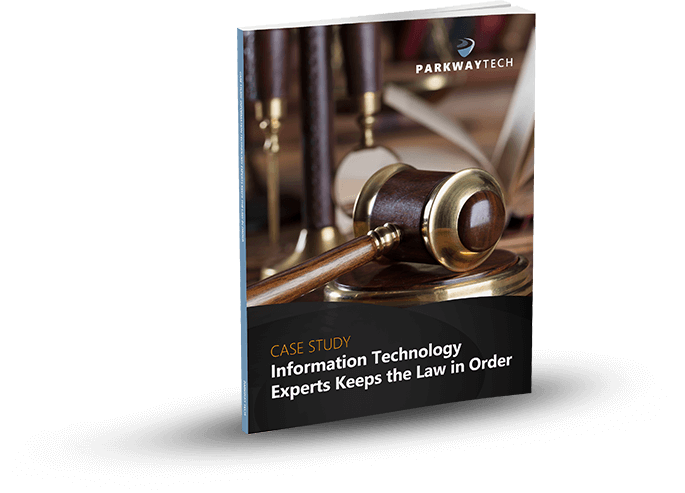Chris Michalec Talks About MSPs And Both Sides Of The Law
When a law firm needs help with technology, they call a managed IT services provider (MSP). MSPs offer cloud data storage and cybersecurity, but how does the relationship impact the attorney-client privilege?
Law firms are an interesting dichotomy. One step inside a law firm gives a visitor immense insight into the two worlds colliding: the past and the present. One world filled with legal texts and case files, and another world reliant on technology.

The more attorneys on staff at a law firm, or the longer the firm has been in practice, the more caseload the firm has on record. Over time, it’s no longer practical to store these records in paper file format.
Converting these files to digital format for storage in the cloud is no easy task, but the ability to search, share, and access this information stored in the cloud is vastly simplified compared to locating the correct filing cabinet – or worse, off-site storage.
While cloud-based data storage simplifies every aspect of firm operations, converting your data presents a unique set of complexities. Protecting your data is more important than anything else. Your data is your most critical asset, and it’s your duty to keep it safe for your clients.
Are law firms the target of cybercriminals?
Definitely.
Minimize Risk
Modernizing a law firm by migrating to the cloud poses a higher risk of being targeted by cybercriminals – hackers – for the personally identifiable information (PII) on file. The sheer volume of information on individuals, including where they live, where they work, and even healthcare records in some cases, is a very attractive target for hackers.
According to The American Bar Association’s 2017 Legal Technology Survey, roughly one-fifth of U.S.-based law firms were targeted by hackers in 2017, varying in scope and method.
Law firms working with managed services providers (MSP) for IT solutions like cloud storage and cybersecurity are poised for a better line of defense against these types of attacks with services like malware protection, remote monitoring, and data backups.
Smarter MSP recently reached out to Parkway Tech’s founder, Chris Michalec, for their feature on MSPs and the Law: What You Need to Know, who offered insights into the growing issues surrounding the relationships of MSPs and law firms.
One of the greatest challenges MSPs face is the critical attorney-client privilege, and the amount of confidential information processed and stored by law firms. “It is the volume of confidential information. Many firms have medical records, wills, tax returns, etc., and that makes them a ripe target for hackers,” Michalec says.
Working with an MSP to closely monitor systems and protect against threats can help detect possible data breaches or problems that may come up, and the quicker reaction time could be worth millions of dollars in savings. At times, this threat can be from internal sources, however unintentional. No matter if the risk is internal or external, the tiniest breach can expand exponentially before detection without the attention of a dedicated threat safeguarding resource, like an MSP.
Protecting Information On Two Sides
Michalec stressed training and education to Smarter MSP, “The employee education is the most difficult but also the most important part.”
What he means by this is that firewalls, remote monitoring, and penetration testing can only do so much – the staff at law firms need to do their part to maintain secure environments. Three typical pain points here include
- Password best practices: Complex and unique passwords using a combination of uppercase and lowercase letters, numbers, and special characters.
- Email safety: Recognizing spam and phishing attempts and not clicking on anything that might grant access to your system for unauthorized users through an email account.
- Safe surfing: Installing web filters for safe Internet use for staff that prevents access to unsafe content.
Modern law firms bring sophisticated needs for consideration, with multiple offices and multiple data storage solution needs. With the introduction of an MSP into the mix, Michalec focuses on the MSP’s need to be sensitive when managing the actual data, such as confidential information pertaining to a case, or HIPAA-protected data, like medical records.
Law firms aren’t governed separately but are still required to adhere to HIPAA regulations for medical records, which requires a firm process in place for staff handling this information.
The Bottom Line
Michalec points out the cost factor: “One of the surprising things about law firms is how many of these smaller firms have at least one full-time IT staff person.”
The cost of the salary of a full-time IT team member is expensive and has limitations, whereas the monthly fee paid to an MSP gives a law firm access to several talented team members available to address specific IT needs in a timely manner.
Managing the data without seeing the information, protecting the data, and saving law firms money is what attorneys would call an “open and shut” case!
Did you like what you read here? Enjoy more like this:
- Cybersecurity Risks (Problems/Fixes)
- 4 Tips For Working Securely On Wi-Fi
- Insights From A Law Firm Technology Support Specialist
Can Your Legal IT Services Firm Keep Law & Order With Your Practice’s Technology?

Learn how Parkway’s Legal IT Services helps firms across North Carolina achieve better results.
Click Here
Download Our Free Report



